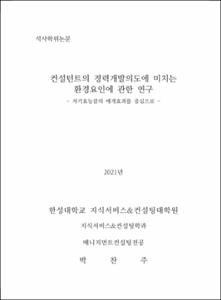컨설턴트의 경력개발의도에 미치는 환경요인에 관한 연구
= A Study on the Environmental Factors Affecting the Consultant’s Career Develop Intention : Focusing on the intermediate effect of self-efficacy
- Type
- Thesis
- Alternative Title
- 자기효능감의 매개효과를 중심으로
- Advisor
- 유연우
- Department
- 지식서비스&컨설팅대학원 지식서비스&컨설팅학과
- Issued Date
- 2021
- Publisher
- 한성대학교 지식서비스&컨설팅대학원
- Appears in Collections:
- 지식서비스&컨설팅학과 > 1. Thesis
- Files in This Item:
-
-
Download
 200000498872.pdf
기타 데이터 / 806.07 kB / Adobe PDF
200000498872.pdf
기타 데이터 / 806.07 kB / Adobe PDF
-
Items in Repository are protected by copyright, with all rights reserved, unless otherwise indicated.